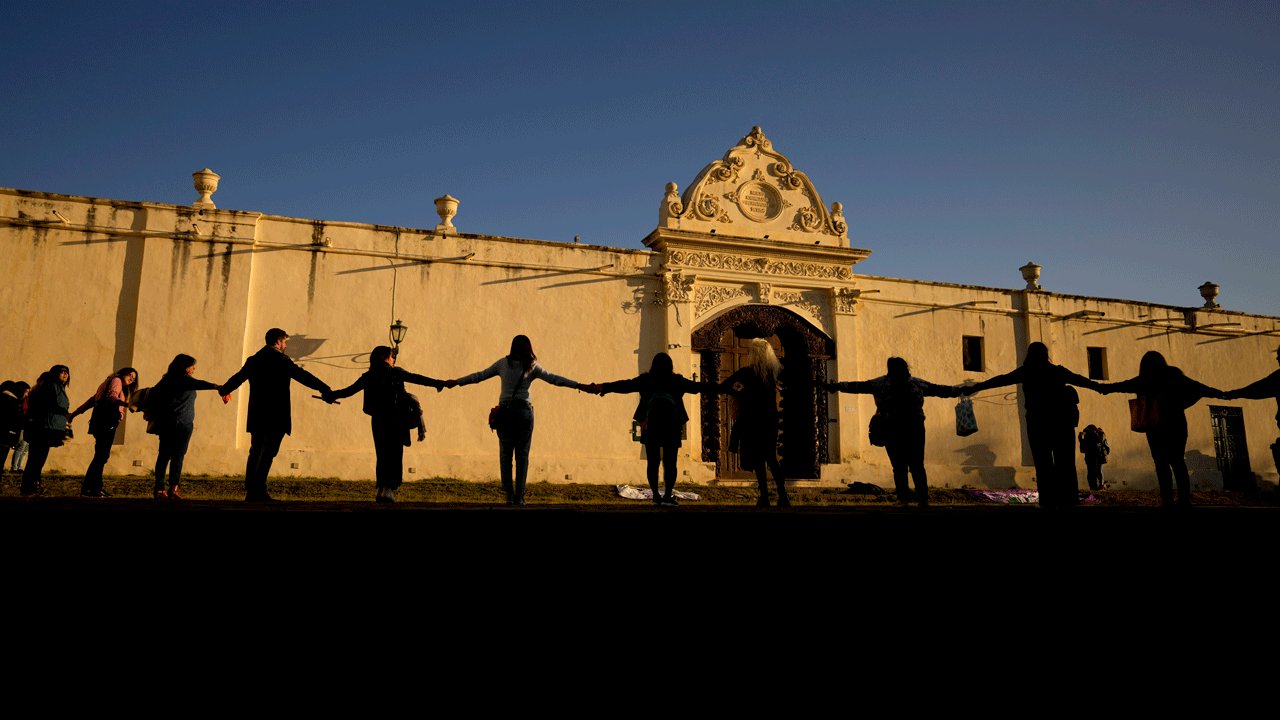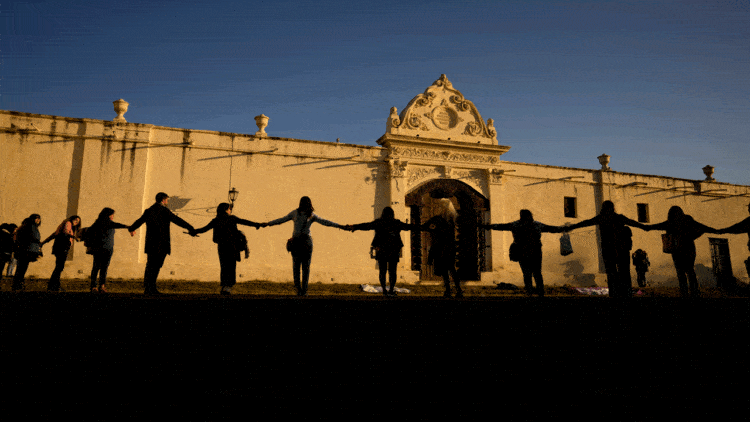BUNEOS AIRES, Argentina (AP) — An Argentine judge on Friday ruled that 20 cloistered nuns had suffered abuse for more than two decades at the hands of high-ranking clergy in the country’s conservative north, and ordered the accused archbishop and church officials to undergo psychological treatment and training in gender discrimination.
The ruling in the homeland of Pope Francis cast a spotlight on the long-standing of abuse of nuns by priests and bishops in the Catholic Church.
ARGENTINA’S MILEI TAKES HIS CHAINSAW TO THE STATE, CUTTING 15,000 JOBS AND SPURRING PROTESTS
Though long overshadowed by other church scandals, such abuses in religious life are increasingly being aired and denounced as a result of nuns feeling emboldened by the #MeToo movement, which has a corollary in the church, #NunsToo.

Women gather round the San Bernardo Convent in support of the convent’s cloistered nuns who accused the Archbishop of Salta Mario Antonio Cargnello and other church officials of gender-based psychological and physical violence, in Salta, Argentina, May 3, 2022. An Argentine court ruled on Thursday, April 4, 2024, that Cargnello and three other church officials committed different forms of violence against the cloistered nuns of the convent. (AP Photo/Natacha Pisarenko)
“I conclude and affirm that the nuns have suffered acts of gender violence religiously, physically, psychologically and economically for more than 20 years,” Judge Carolina Cáceres said in the ruling from Salta in northwestern Argentina.
She also ordered the verdict be conveyed to Francis.
The four accused clergy members have denied committing any violence. The archbishop’s lawyer, Eduardo Romani, dismissed Friday’s ruling as baseless and vowed to appeal. Still, he said, the archbishop would abide by the order to receive treatment and anti-discrimination training through a local NGO “whether or not he agrees with its basis.”
The nuns’ lawyer hailed the verdict as unprecedented in Argentina in recognizing the plaintiffs’ plight and the deeper problem of gender discrimination.
“It’s shatters the ‘status quo’ because it targets a person with a great deal of power,” said José Viola, the lawyer.
In recent years, several prominent cases have emerged involving nuns, laywomen or consecrated women denouncing spiritual, psychological, physical or sexual abuse by once-exalted priests.
But complaints have largely fallen on deaf ears at the Vatican and in the all-male hierarchy at the local level in Argentina, apparently prompting the nuns in Salta to seek remedy in the secular justice system. A similar dynamic played out when the clergy abuse of minors scandal first erupted decades ago and victims turned to the courts because of inaction by church authorities.
The 20 nuns from the reclusive order of Discalced Carmelites at San Bernardo Monastery — dedicated to solitude, silence and daily contemplative prayer — brought their case forward in 2022, sending shockwaves through conservative Salta.
Their complaints cited a range of mistreatment including verbal insults, threats, humiliation and physical — although not sexual — assault.
CLICK HERE TO GET THE FOX NEWS APP
The nuns describe archbishop Mario Cargnello as grabbing, slapping and shaking women. At one point, they said, Cargnello squeezed the lips of a nun to silence her. At another, he pounced on a nun, pinning her to the ground. They also accused Cargello of borrowing nuns’ money without paying them back.
Cáceres, the judge, described the instances as part of a pattern of “physical and psychological gender violence” generated by the church’s rigid hierarchy and culture of silence.
(this story has not been edited by TSA Mag staff and is published from a syndicated feed.)
BUNEOS AIRES, Argentina (AP) — An Argentine judge on Friday ruled that 20 cloistered nuns had suffered abuse for more than two decades at the hands of high-ranking clergy in the country’s conservative north, and ordered the accused archbishop and church officials to undergo psychological treatment and training in gender discrimination.
The ruling in the homeland of Pope Francis cast a spotlight on the long-standing of abuse of nuns by priests and bishops in the Catholic Church.
ARGENTINA’S MILEI TAKES HIS CHAINSAW TO THE STATE, CUTTING 15,000 JOBS AND SPURRING PROTESTS
Though long overshadowed by other church scandals, such abuses in religious life are increasingly being aired and denounced as a result of nuns feeling emboldened by the #MeToo movement, which has a corollary in the church, #NunsToo.

Women gather round the San Bernardo Convent in support of the convent’s cloistered nuns who accused the Archbishop of Salta Mario Antonio Cargnello and other church officials of gender-based psychological and physical violence, in Salta, Argentina, May 3, 2022. An Argentine court ruled on Thursday, April 4, 2024, that Cargnello and three other church officials committed different forms of violence against the cloistered nuns of the convent. (AP Photo/Natacha Pisarenko)
“I conclude and affirm that the nuns have suffered acts of gender violence religiously, physically, psychologically and economically for more than 20 years,” Judge Carolina Cáceres said in the ruling from Salta in northwestern Argentina.
She also ordered the verdict be conveyed to Francis.
The four accused clergy members have denied committing any violence. The archbishop’s lawyer, Eduardo Romani, dismissed Friday’s ruling as baseless and vowed to appeal. Still, he said, the archbishop would abide by the order to receive treatment and anti-discrimination training through a local NGO “whether or not he agrees with its basis.”
The nuns’ lawyer hailed the verdict as unprecedented in Argentina in recognizing the plaintiffs’ plight and the deeper problem of gender discrimination.
“It’s shatters the ‘status quo’ because it targets a person with a great deal of power,” said José Viola, the lawyer.
In recent years, several prominent cases have emerged involving nuns, laywomen or consecrated women denouncing spiritual, psychological, physical or sexual abuse by once-exalted priests.
But complaints have largely fallen on deaf ears at the Vatican and in the all-male hierarchy at the local level in Argentina, apparently prompting the nuns in Salta to seek remedy in the secular justice system. A similar dynamic played out when the clergy abuse of minors scandal first erupted decades ago and victims turned to the courts because of inaction by church authorities.
The 20 nuns from the reclusive order of Discalced Carmelites at San Bernardo Monastery — dedicated to solitude, silence and daily contemplative prayer — brought their case forward in 2022, sending shockwaves through conservative Salta.
Their complaints cited a range of mistreatment including verbal insults, threats, humiliation and physical — although not sexual — assault.
CLICK HERE TO GET THE FOX NEWS APP
The nuns describe archbishop Mario Cargnello as grabbing, slapping and shaking women. At one point, they said, Cargnello squeezed the lips of a nun to silence her. At another, he pounced on a nun, pinning her to the ground. They also accused Cargello of borrowing nuns’ money without paying them back.
Cáceres, the judge, described the instances as part of a pattern of “physical and psychological gender violence” generated by the church’s rigid hierarchy and culture of silence.
















